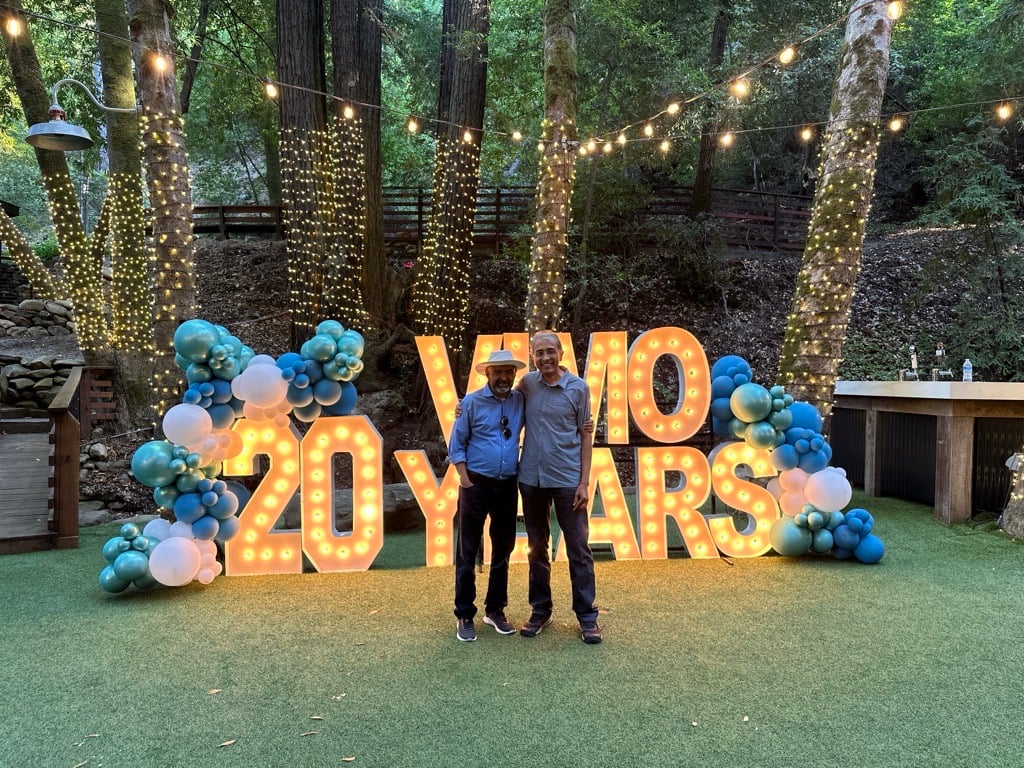As Vimo® celebrates its 20th anniversary in 2025, cofounders Chini Krishnan and Shankar Srinivasan recently sat down to reflect on the company’s journey. From shifts in the health care and technology industries to the company’s core values and earliest hurdles, the lively discussion gave insights into their two decades at the helm – and offered a glimpse of the next 20 years. (This interview has been edited for length and clarity.)
How did the company get its start?
Chini Krishnan, Chief Executive Officer: It was 2004 when I sold my last company, Valicert, a company in digital computer security. I took about a year off, and at the end of the year, David Cowan, who is our largest investor and was an investor in Valicert, invited me to hang out at Bessemer to see if we could cook up something new. We looked at a lot of things, but then I read an essay on how the internet was coming to health care in a big way and how consumers would manage their own destiny in accessing health care. I found the paper very intriguing, and I wanted to work on something with a lot of heart. So, I went to David and said, “Why don’t we do something in health care?” And he said, “Sure!” And we started exploring it.
It wasn’t until I connected with Shankar that the idea really came together. Shankar is quite brilliant, and he rather brilliantly won me over, so I invited him to come on board. And that’s how we got started.
Shankar Srinivasan, General Manager: Chini and I were in a similar place at that time. I had just sold my previous company and, similarly, was kind of in a year of sabbatical time. My last company had been in the financial services industry, but before that, I had been with WebMD, so health care has always been close to my heart. At one point, I aspired to be a doctor but somehow found my path in engineering instead. Still, I’ve always felt a strong pull toward health care and have been passionate about finding ways to contribute to the field. And after meeting with Chini, it seemed like a great opportunity and a second chance to address some of those challenges.
Thinking back over the last 20 years, what were some of the most noticeable inflection points?
Chini: The Affordable Care Act is the biggest one. Prior to the ACA, we wanted to build more of a consumer-focused company, an Expedia for health insurance. And that’s the business model we were marching toward. But after the ACA passed, it was pretty clear that 90% of our consumers had shifted to needing to buy health insurance on state-run marketplaces. That’s when we made the decision to take our software and sell it to states. And that was a wonderful decision.
Shankar: The goal was always to serve the maximum number of people we could, which kind of makes sense both from a service perspective as well as from a business perspective. And we actually started out even broader, as Chini was saying, with consumer-directed health care. We didn’t just start with the insurance piece. We did a lot of interesting stuff in the early days to essentially bring more transparency to health care. When you go to get an MRI or another procedure, you don’t know what it’s going to cost you or what it’s going to cost the insurance company. You don’t know which hospitals are better than others or which stand-alone clinics are better. Bringing transparency to some of those challenges is some of what we set out to try and address. We made some really interesting inroads and got coverage in various media, but it was the health insurance piece where we saw the greatest need and also the ability to actually run the business.
When we started, in the battle days before the ACA, it was pretty complicated to buy health insurance if you weren’t covered by your employer. There were all sorts of hoops you had to jump through and essentially had to prove that you didn’t need health insurance in order to buy health insurance. And if you did need coverage because of a pre-existing condition, or because of your age, for instance, insurers would charge higher premiums or deny coverage altogether. Those are some of the issues the ACA took on. So, when we saw the ACA passed, and we saw that that’s where the future was, that’s where people were going to go to acquire health insurance – we decided we’d service that market.
What were the early hurdles at the beginning of the company?
Shankar: There are some things we started that faced a lot of resistance at that time but have now become kind of commonplace. We tried to create a site where people could rate their doctors and their hospitals, and we got a lot of interest, but also a lot of pushback. And now it’s commonplace.
Chini: That’s true. But, you know, a lot of building a business is about having the confluence of smart people focused on the right opportunity, a bit of luck, and a lot of self-belief. And we’ve been sort of lucky in having most of those ingredients, but it’s taken a while.
Shankar: In that sense, yeah, picking the paths you don’t go down is almost as important as picking the path you do go down.
What are the core values that have remained more or less constant throughout the years, and how have they shaped the company and the company culture?
Chini: I would say, I think we do put our customer success at the center of what we do – and always have. We live deeply in our customers’ shoes, and we sweat a lot of details, as our team does, whether it’s technology, operations, or even customer service – and that’s one thing that makes us special, and we hold on to.
We’ve made a very conscious decision to run our business by placing more emphasis on relationships over transactions. I think it’s a better way to live your life in general. I do think, over time, in a world where our most precious resource is time, we’ve focused on scalability and impact and centered our time and attention on the large opportunities. I think we’re a supportive team.
Shankar: I think that’s the critical thing to me, too. We encourage a very collaborative culture, and I think that’s very important.
What role has your choice of staff played in the company’s evolution and milestones?
Chini: For me, it boils down to getting the best partners and staff. For example, we had David Cowan as the investor and Shankar as the cofounder and Sanjeev Jorapur as the guy that runs engineering. I think of everybody on our staff and on our executive team – Ted Tobiason as our CFO, Paul Neutz as our business development person, Mike Daugherty to run our call center, Jason Sparks to run our implementations, Heather Korbulic to run policy and marketing – and how, when we hire someone, those are the moments where we go, “All right. We roped one more in. That’s going to make a big, big difference.” That would be my way to think about some of our milestones: relationships.
Shankar: And I think Chini is particularly good at finding people like that. He’s done a great job of assembling the right group of folks. I mean, our folks work really hard. So, it’s not that they’re here because they can relax, rather they believe in what we’re working toward. I think we certainly challenge people. But they want to stay with us, which is wonderful.
What are some considerations you think Vimo has that other tech companies don’t?
Shankar: I think one is, given that our primary customers are states, they have significant responsibilities. They have a lot of compliance requirements, so the bar is far higher in terms of meeting those needs. It’s not a “move fast and break things” kind of environment.
Chini: That’s a good way to say it. We’re much more about innovating thoughtfully. So that has impacts on how you behave and who you are.
Based on everything you’ve learned about health care policy and culture in the US in the last 20 years, what technological advancements do you see on the horizon?
Shankar: Technology obviously moves very rapidly. You know, AI is going to revolutionize a number of things. It’s probably going to pervade our lives in ways we aren’t even thinking of yet. At the same time, there are also existing interests that might resist change. I mean, it’s easy to dream up solutions, but they have to satisfy all the existing players and somehow overcome that resistance. So that’s what makes a prediction game so hard – human behavior and existing players have to be factored into the equation somehow.
Chini: I do think, though, in the next 20 years, AI will reshape how public health programs are delivered – making it possible to anticipate needs, personalize support, and reach communities with greater speed and precision than ever before. We have only so far seen a glimpse of its potential.
Vimo has acquired C!A, Call AI, Array Health, and ACA Express. What did you learn from those acquisitions?
Chini: Every acquisition moves you forward. So, we bought ACA Express, which helped us become a leader in enhanced direct enrollment, and when Georgia Access launched, which runs off EDE, we had a distinct advantage. And while we didn’t know where that acquisition would take us, it played out in this amazing way.
Shankar: Our very first acquisition was Premier Financial Group. Call centers were really not in our DNA, but having acquired one, we were forced to understand it and develop that muscle. While we didn’t know the depth of its potential at the time, much like ACA Express, it ultimately ended up being a reason that we won exchange business. The point being that some of these acquisitions pay off in ways that you didn’t anticipate when you got into them.
Chini: I like that. As with any business, it works out for reasons you don’t think about going in. C!A gave us the institutional knowledge and the chops and the confidence to get into Medicaid and other safety net programs, which we would not have had absent that acquisition, and without the passionate team of Blake Shaw, Sean Toole, Michael Jones, and Bill McCracken, to name just a few. So, we’re deeply grateful for that.
Thinking about the future, what do you envision for Vimo for the next 20 years?
Chini: We’re only getting started. That is genuinely true.
Shankar: Agreed.
Chini: We’re growing at a faster clip than ever before and are having a greater impact than we’ve ever had any time in our existence. The opportunity in front of us is bigger than it was two or three years ago.
Shankar: The opportunity is huge.
Chini: But there’s goodness to it. The opportunity is so vast, so amazing, and our ability to intervene and create good is so much larger.
Shankar: It takes a while for the solutions that we’re offering to be accepted and for us to build the reputation that we have. And now so much of what we’ve learned and developed over the last 10 or 15 years translates so well to these new opportunities. We can help states service their citizens better and at a far lower cost than they ever have.
Chini: The last thing I’ll say is, look, there are things that you know should be our North Star. Kindness, doing good, for instance, ought to be a North Star, and it’s one that we will continue to follow in the years to come.


Recent Comments